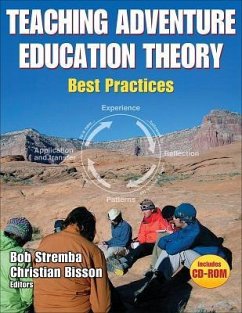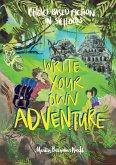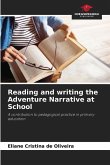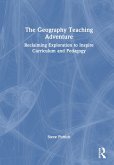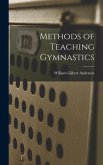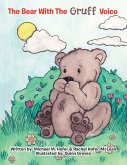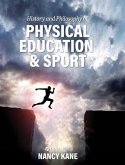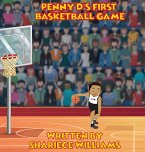Teaching Adventure Education Theory
Best Practices
Herausgeber: Bisson, Christian; Stremba, Robert
Teaching Adventure Education Theory
Best Practices
Herausgeber: Bisson, Christian; Stremba, Robert
- Broschiertes Buch
- Merkliste
- Auf die Merkliste
- Bewerten Bewerten
- Teilen
- Produkt teilen
- Produkterinnerung
- Produkterinnerung
This new book offers stimulating, fun and engaging activities instructors can use to assist future adventure educators, outdoor leaders and group facilitators in making the connections between adventure theory and practice.
Andere Kunden interessierten sich auch für
![Write Your Own Adventure Write Your Own Adventure]() Martin Barnabus NoutchWrite Your Own Adventure19,99 €
Martin Barnabus NoutchWrite Your Own Adventure19,99 €![Reading and writing the Adventure Narrative at School Reading and writing the Adventure Narrative at School]() Eliane Cristina de OliveiraReading and writing the Adventure Narrative at School37,99 €
Eliane Cristina de OliveiraReading and writing the Adventure Narrative at School37,99 €![The Geography Teaching Adventure The Geography Teaching Adventure]() Steve PuttickThe Geography Teaching Adventure174,99 €
Steve PuttickThe Geography Teaching Adventure174,99 €![Methods of Teaching Gymnastics Methods of Teaching Gymnastics]() William Gilbert AndersonMethods of Teaching Gymnastics37,99 €
William Gilbert AndersonMethods of Teaching Gymnastics37,99 €![The Bear With The Gruff Voice The Bear With The Gruff Voice]() Michael M. HoferThe Bear With The Gruff Voice18,99 €
Michael M. HoferThe Bear With The Gruff Voice18,99 €![History and Philosophy of Physical Education and Sport History and Philosophy of Physical Education and Sport]() Nancy KaneHistory and Philosophy of Physical Education and Sport202,99 €
Nancy KaneHistory and Philosophy of Physical Education and Sport202,99 €![Penny D's First Basketball Game Penny D's First Basketball Game]() Shariece M WilliamsPenny D's First Basketball Game22,99 €
Shariece M WilliamsPenny D's First Basketball Game22,99 €-
-
-
This new book offers stimulating, fun and engaging activities instructors can use to assist future adventure educators, outdoor leaders and group facilitators in making the connections between adventure theory and practice.
Hinweis: Dieser Artikel kann nur an eine deutsche Lieferadresse ausgeliefert werden.
Hinweis: Dieser Artikel kann nur an eine deutsche Lieferadresse ausgeliefert werden.
Produktdetails
- Produktdetails
- Verlag: Human Kinetics Publishers
- Seitenzahl: 408
- Erscheinungstermin: 21. Januar 2009
- Englisch
- Abmessung: 216mm x 278mm x 25mm
- Gewicht: 1135g
- ISBN-13: 9780736071260
- ISBN-10: 0736071261
- Artikelnr.: 25436129
- Herstellerkennzeichnung
- Libri GmbH
- Europaallee 1
- 36244 Bad Hersfeld
- gpsr@libri.de
- Verlag: Human Kinetics Publishers
- Seitenzahl: 408
- Erscheinungstermin: 21. Januar 2009
- Englisch
- Abmessung: 216mm x 278mm x 25mm
- Gewicht: 1135g
- ISBN-13: 9780736071260
- ISBN-10: 0736071261
- Artikelnr.: 25436129
- Herstellerkennzeichnung
- Libri GmbH
- Europaallee 1
- 36244 Bad Hersfeld
- gpsr@libri.de
Bob Stremba, EdD, is associate professor and director of adventure education in the department of exercise science at Fort Lewis College in Durango, Colorado, where he teaches a wide range of adventure courses both in the field and in the classroom. As a seasonal instructor and course director for Outward Bound Wilderness, Stremba enjoys the opportunity to put the theories of adventure education into action. Stremba has developed adventure education programs at three universities in the United States and has taught conceptual, theoretical, and technical adventure skills to undergraduates for nearly 10 years, using experiential and hands-on activities to illustrate concepts and theories in his classroom teaching. He has presented his work on experiential education for adventure theory at several conferences for the Association for Experiential Education (AEE) and the Wilderness Education Association. A member of AEE, Stremba also serves on the board of directors and as a member of four AEE international and regional conference committees, and he is a former member of the AEE's Accredidation Council. He is also a member of the Wilderness Education Association. Stremba resides in Durango and enjoys backpacking, moutain biking, and snow skiing. Christian A. Bisson, EdD, is an associate professor of adventure education at Plymouth State University in Plymouth, New Hampshire. Bisson earned his doctorate in physical education with a specialization in pedagogy. He is a former editor of the CORE Newsletter for the Association for Experiential Education (AEE) Schools and Colleges professional group and served on the Educational Resources Information Center (ERIC) Clearinghouse on Rural and Small Schools. Bisson was also an Outdoor Education editorial board member from 2001 to 2004. In 2000, Bisson received an Outstanding Teaching Award from Northland College. He also received the Outstanding Experiential Teacher of the Year Award from the Association for Experiential Education in 1997. He and his wife, Julie, reside in Plymouth. In his free time, Bisson enjoys parenting and, when possible, woodworking, hiking, and paddling.
Part I: Introduction to Teaching Adventure Education Theory
Chapter 1: The Unique Curriculum of Adventure Education
Chapter 2: Teaching Theory, Facts, and Abstract Concepts Effectively
Part II: Instructional Theory
Lesson 1: Addressing Multiple Ways of Knowing in Adventure Education
Kate J. Cassidy
Lesson 2: Multiple Intelligence Theory and Learning Styles
Mary C. Breunig
Lesson 3: Using Backward Design: A Methodology to Develop Experiential
Lessons
Alison Rheingold
Part III: History
Lesson 4: Visionary and Actionary: The Influence of Hahn and Petzoldt on
the Development of Adventure Education
Christian A. Bisson
Lesson 5: A History of Outdoor Adventure Education in the United States
Ed Raiola and Marty O'Keefe
Lesson 6: Creating History: Exploring the Past and Future of Adventure
Education
Jacquie Medina
Lesson 7: Adventure Education History Roundtable
Brad Daniel
Part IV: Educational and Philosophical Foundations
Lesson 8: The Four Uses of Outdoor Adventure Programming
Bob Stremba
Lesson 9: Philosophical Influences in Outdoor, Adventure, and Experiential
Education
Christian A. Bisson
Lesson 10: Teaching Dewey's Experience and Education Experientially
Mary C. Breunig
Lesson 11: How Do We Learn? An Exploration of John Dewey's Pattern of
Inquiry
Leslie E. Rapparlie
Part V: Theoretical Foundations
Lesson 12: Creating the Right Amount of Challenge: Optimal Arousal Theory
and the Adventure Experience Paradigm
Christian A. Bisson
Lesson 13: I Think I Can: Self-Efficacy Theory in Adventure Programming
Christian A. Bisson
Lesson 14: Attribution Theory in Adventure Programming
Christian A. Bisson
Lesson 15: Flow Theory: Risk Taking and Adventure Experiences
Ed Raiola and Marty O'Keefe
Part VI: Leadership Theories
Lesson 16: Conditional Outdoor Leadership Meets Kolb's Learning Cycle
Bob Stremba
Lesson 17: Three Functions of Leadership Essential to the Welfare of a
Group
Denise Mitten
Lesson 18: Using Situational Leadership Theory in Decision Making
Maurice Phipps
Lesson 19: Decision-Making Traps
Bob Stremba
Part VII: Professional Ethics and Social Justice Issues
Lesson 20: Introduction to Social Justice in Outdoor Adventure Education
Karen Warren
Lesson 21: Outdoor Leadership With Gender in Mind
Karen Warren
Lesson 22: The First-Generation Condition in Adventure Education
Jackson Wilson, Aya Hayashi, and Alan Ewert
Lesson 23: Be Safe Out There: Critically Thinking Risk in Adventure
Education
Denise Mitten and Martyn Whittgham
Part VIII: Group Development
Lesson 24: Small Group Development in Outdoor Adventure
Karen Warren
Lesson 25: An Alternative to Tuckman: Three Factors in Group Development
Kate J. Cassidy
Lesson 26: Setting the Stage: How to Get the Group Norms You Want
Denise Mitten
Lesson 27: Setting Group Norms and Expedition Behavior
Maurice Phipps
Part IX: Processing and Facilitation Models
Lesson 28: Six Generations of Facilitation
Bob Stremba
Lesson 29: Visual Reflections: Using Photographs to Facilitate Adventure
Experiences
Jacquie Medina
Lesson 30: Growth at the Edge: Expanding Our Comfort Zones
Bob Stremba
Part X: The Human-Nature Connection
Lesson 31: My Land Is Your Land Too: American Public Land and Multiple-Use
Policies
Christian A. Bisson
Lesson 32: Loving Nature Through Adventure: Examining Human-Nature
Interaction
Peter Martin
Lesson 33: A Walk in the Woods: Teaching Ecopsychology Experientially
Bob Henderson and Deborah Schrader
Lesson 34: Loving the Land for Life: The Vital Role of Recreation Ecology
Kelly Rossiter
Chapter 1: The Unique Curriculum of Adventure Education
Chapter 2: Teaching Theory, Facts, and Abstract Concepts Effectively
Part II: Instructional Theory
Lesson 1: Addressing Multiple Ways of Knowing in Adventure Education
Kate J. Cassidy
Lesson 2: Multiple Intelligence Theory and Learning Styles
Mary C. Breunig
Lesson 3: Using Backward Design: A Methodology to Develop Experiential
Lessons
Alison Rheingold
Part III: History
Lesson 4: Visionary and Actionary: The Influence of Hahn and Petzoldt on
the Development of Adventure Education
Christian A. Bisson
Lesson 5: A History of Outdoor Adventure Education in the United States
Ed Raiola and Marty O'Keefe
Lesson 6: Creating History: Exploring the Past and Future of Adventure
Education
Jacquie Medina
Lesson 7: Adventure Education History Roundtable
Brad Daniel
Part IV: Educational and Philosophical Foundations
Lesson 8: The Four Uses of Outdoor Adventure Programming
Bob Stremba
Lesson 9: Philosophical Influences in Outdoor, Adventure, and Experiential
Education
Christian A. Bisson
Lesson 10: Teaching Dewey's Experience and Education Experientially
Mary C. Breunig
Lesson 11: How Do We Learn? An Exploration of John Dewey's Pattern of
Inquiry
Leslie E. Rapparlie
Part V: Theoretical Foundations
Lesson 12: Creating the Right Amount of Challenge: Optimal Arousal Theory
and the Adventure Experience Paradigm
Christian A. Bisson
Lesson 13: I Think I Can: Self-Efficacy Theory in Adventure Programming
Christian A. Bisson
Lesson 14: Attribution Theory in Adventure Programming
Christian A. Bisson
Lesson 15: Flow Theory: Risk Taking and Adventure Experiences
Ed Raiola and Marty O'Keefe
Part VI: Leadership Theories
Lesson 16: Conditional Outdoor Leadership Meets Kolb's Learning Cycle
Bob Stremba
Lesson 17: Three Functions of Leadership Essential to the Welfare of a
Group
Denise Mitten
Lesson 18: Using Situational Leadership Theory in Decision Making
Maurice Phipps
Lesson 19: Decision-Making Traps
Bob Stremba
Part VII: Professional Ethics and Social Justice Issues
Lesson 20: Introduction to Social Justice in Outdoor Adventure Education
Karen Warren
Lesson 21: Outdoor Leadership With Gender in Mind
Karen Warren
Lesson 22: The First-Generation Condition in Adventure Education
Jackson Wilson, Aya Hayashi, and Alan Ewert
Lesson 23: Be Safe Out There: Critically Thinking Risk in Adventure
Education
Denise Mitten and Martyn Whittgham
Part VIII: Group Development
Lesson 24: Small Group Development in Outdoor Adventure
Karen Warren
Lesson 25: An Alternative to Tuckman: Three Factors in Group Development
Kate J. Cassidy
Lesson 26: Setting the Stage: How to Get the Group Norms You Want
Denise Mitten
Lesson 27: Setting Group Norms and Expedition Behavior
Maurice Phipps
Part IX: Processing and Facilitation Models
Lesson 28: Six Generations of Facilitation
Bob Stremba
Lesson 29: Visual Reflections: Using Photographs to Facilitate Adventure
Experiences
Jacquie Medina
Lesson 30: Growth at the Edge: Expanding Our Comfort Zones
Bob Stremba
Part X: The Human-Nature Connection
Lesson 31: My Land Is Your Land Too: American Public Land and Multiple-Use
Policies
Christian A. Bisson
Lesson 32: Loving Nature Through Adventure: Examining Human-Nature
Interaction
Peter Martin
Lesson 33: A Walk in the Woods: Teaching Ecopsychology Experientially
Bob Henderson and Deborah Schrader
Lesson 34: Loving the Land for Life: The Vital Role of Recreation Ecology
Kelly Rossiter
Part I: Introduction to Teaching Adventure Education Theory
Chapter 1: The Unique Curriculum of Adventure Education
Chapter 2: Teaching Theory, Facts, and Abstract Concepts Effectively
Part II: Instructional Theory
Lesson 1: Addressing Multiple Ways of Knowing in Adventure Education
Kate J. Cassidy
Lesson 2: Multiple Intelligence Theory and Learning Styles
Mary C. Breunig
Lesson 3: Using Backward Design: A Methodology to Develop Experiential
Lessons
Alison Rheingold
Part III: History
Lesson 4: Visionary and Actionary: The Influence of Hahn and Petzoldt on
the Development of Adventure Education
Christian A. Bisson
Lesson 5: A History of Outdoor Adventure Education in the United States
Ed Raiola and Marty O'Keefe
Lesson 6: Creating History: Exploring the Past and Future of Adventure
Education
Jacquie Medina
Lesson 7: Adventure Education History Roundtable
Brad Daniel
Part IV: Educational and Philosophical Foundations
Lesson 8: The Four Uses of Outdoor Adventure Programming
Bob Stremba
Lesson 9: Philosophical Influences in Outdoor, Adventure, and Experiential
Education
Christian A. Bisson
Lesson 10: Teaching Dewey's Experience and Education Experientially
Mary C. Breunig
Lesson 11: How Do We Learn? An Exploration of John Dewey's Pattern of
Inquiry
Leslie E. Rapparlie
Part V: Theoretical Foundations
Lesson 12: Creating the Right Amount of Challenge: Optimal Arousal Theory
and the Adventure Experience Paradigm
Christian A. Bisson
Lesson 13: I Think I Can: Self-Efficacy Theory in Adventure Programming
Christian A. Bisson
Lesson 14: Attribution Theory in Adventure Programming
Christian A. Bisson
Lesson 15: Flow Theory: Risk Taking and Adventure Experiences
Ed Raiola and Marty O'Keefe
Part VI: Leadership Theories
Lesson 16: Conditional Outdoor Leadership Meets Kolb's Learning Cycle
Bob Stremba
Lesson 17: Three Functions of Leadership Essential to the Welfare of a
Group
Denise Mitten
Lesson 18: Using Situational Leadership Theory in Decision Making
Maurice Phipps
Lesson 19: Decision-Making Traps
Bob Stremba
Part VII: Professional Ethics and Social Justice Issues
Lesson 20: Introduction to Social Justice in Outdoor Adventure Education
Karen Warren
Lesson 21: Outdoor Leadership With Gender in Mind
Karen Warren
Lesson 22: The First-Generation Condition in Adventure Education
Jackson Wilson, Aya Hayashi, and Alan Ewert
Lesson 23: Be Safe Out There: Critically Thinking Risk in Adventure
Education
Denise Mitten and Martyn Whittgham
Part VIII: Group Development
Lesson 24: Small Group Development in Outdoor Adventure
Karen Warren
Lesson 25: An Alternative to Tuckman: Three Factors in Group Development
Kate J. Cassidy
Lesson 26: Setting the Stage: How to Get the Group Norms You Want
Denise Mitten
Lesson 27: Setting Group Norms and Expedition Behavior
Maurice Phipps
Part IX: Processing and Facilitation Models
Lesson 28: Six Generations of Facilitation
Bob Stremba
Lesson 29: Visual Reflections: Using Photographs to Facilitate Adventure
Experiences
Jacquie Medina
Lesson 30: Growth at the Edge: Expanding Our Comfort Zones
Bob Stremba
Part X: The Human-Nature Connection
Lesson 31: My Land Is Your Land Too: American Public Land and Multiple-Use
Policies
Christian A. Bisson
Lesson 32: Loving Nature Through Adventure: Examining Human-Nature
Interaction
Peter Martin
Lesson 33: A Walk in the Woods: Teaching Ecopsychology Experientially
Bob Henderson and Deborah Schrader
Lesson 34: Loving the Land for Life: The Vital Role of Recreation Ecology
Kelly Rossiter
Chapter 1: The Unique Curriculum of Adventure Education
Chapter 2: Teaching Theory, Facts, and Abstract Concepts Effectively
Part II: Instructional Theory
Lesson 1: Addressing Multiple Ways of Knowing in Adventure Education
Kate J. Cassidy
Lesson 2: Multiple Intelligence Theory and Learning Styles
Mary C. Breunig
Lesson 3: Using Backward Design: A Methodology to Develop Experiential
Lessons
Alison Rheingold
Part III: History
Lesson 4: Visionary and Actionary: The Influence of Hahn and Petzoldt on
the Development of Adventure Education
Christian A. Bisson
Lesson 5: A History of Outdoor Adventure Education in the United States
Ed Raiola and Marty O'Keefe
Lesson 6: Creating History: Exploring the Past and Future of Adventure
Education
Jacquie Medina
Lesson 7: Adventure Education History Roundtable
Brad Daniel
Part IV: Educational and Philosophical Foundations
Lesson 8: The Four Uses of Outdoor Adventure Programming
Bob Stremba
Lesson 9: Philosophical Influences in Outdoor, Adventure, and Experiential
Education
Christian A. Bisson
Lesson 10: Teaching Dewey's Experience and Education Experientially
Mary C. Breunig
Lesson 11: How Do We Learn? An Exploration of John Dewey's Pattern of
Inquiry
Leslie E. Rapparlie
Part V: Theoretical Foundations
Lesson 12: Creating the Right Amount of Challenge: Optimal Arousal Theory
and the Adventure Experience Paradigm
Christian A. Bisson
Lesson 13: I Think I Can: Self-Efficacy Theory in Adventure Programming
Christian A. Bisson
Lesson 14: Attribution Theory in Adventure Programming
Christian A. Bisson
Lesson 15: Flow Theory: Risk Taking and Adventure Experiences
Ed Raiola and Marty O'Keefe
Part VI: Leadership Theories
Lesson 16: Conditional Outdoor Leadership Meets Kolb's Learning Cycle
Bob Stremba
Lesson 17: Three Functions of Leadership Essential to the Welfare of a
Group
Denise Mitten
Lesson 18: Using Situational Leadership Theory in Decision Making
Maurice Phipps
Lesson 19: Decision-Making Traps
Bob Stremba
Part VII: Professional Ethics and Social Justice Issues
Lesson 20: Introduction to Social Justice in Outdoor Adventure Education
Karen Warren
Lesson 21: Outdoor Leadership With Gender in Mind
Karen Warren
Lesson 22: The First-Generation Condition in Adventure Education
Jackson Wilson, Aya Hayashi, and Alan Ewert
Lesson 23: Be Safe Out There: Critically Thinking Risk in Adventure
Education
Denise Mitten and Martyn Whittgham
Part VIII: Group Development
Lesson 24: Small Group Development in Outdoor Adventure
Karen Warren
Lesson 25: An Alternative to Tuckman: Three Factors in Group Development
Kate J. Cassidy
Lesson 26: Setting the Stage: How to Get the Group Norms You Want
Denise Mitten
Lesson 27: Setting Group Norms and Expedition Behavior
Maurice Phipps
Part IX: Processing and Facilitation Models
Lesson 28: Six Generations of Facilitation
Bob Stremba
Lesson 29: Visual Reflections: Using Photographs to Facilitate Adventure
Experiences
Jacquie Medina
Lesson 30: Growth at the Edge: Expanding Our Comfort Zones
Bob Stremba
Part X: The Human-Nature Connection
Lesson 31: My Land Is Your Land Too: American Public Land and Multiple-Use
Policies
Christian A. Bisson
Lesson 32: Loving Nature Through Adventure: Examining Human-Nature
Interaction
Peter Martin
Lesson 33: A Walk in the Woods: Teaching Ecopsychology Experientially
Bob Henderson and Deborah Schrader
Lesson 34: Loving the Land for Life: The Vital Role of Recreation Ecology
Kelly Rossiter

